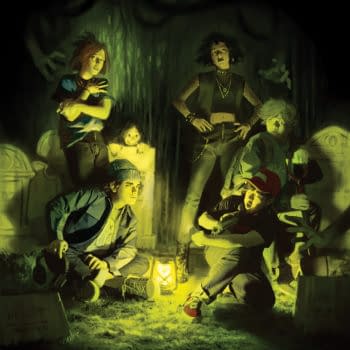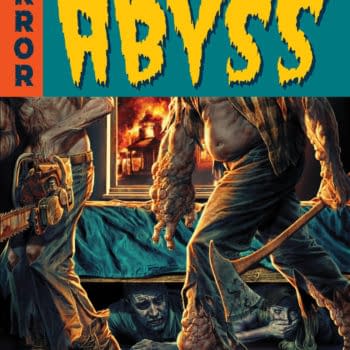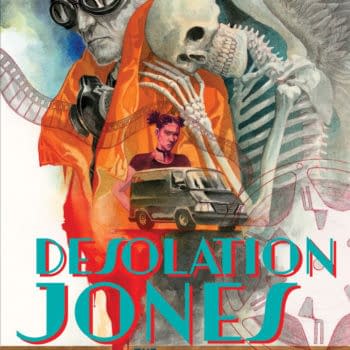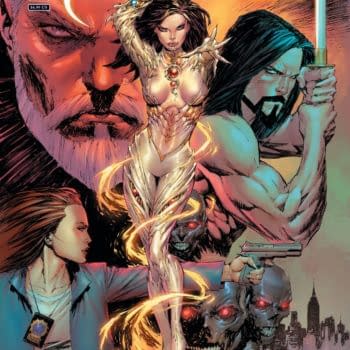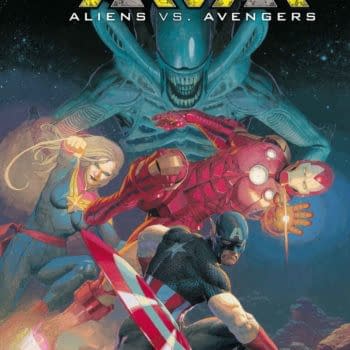Posted in: Comics, Recent Updates | Tagged: Comics, Darby Pop, Dead Squad, entertainment, howard chaykin, Jeff Kline, Matt Federman, stephen scaia
Two Screenwriters Plus Darby Pop Leads To Dead Squad – Talking Shop With Matt Federman And Stephen Scaia
By Michele Brittany, a West Coast Bleeding Cool Correspondent
They met as Script Department Assistants on the popular television show West Wing back in 2003 and since then, Matt Federman and Stephen Scaia have worked together as a writing team on such television series as Charlie's Angels, Human Target, Warehouse 13, and Jericho. As they worked on various projects over the years, they came up with the plot for Dead Squad as a television series. However, when they started working on films, they thought of their idea in terms of a movie instead. Then, when Darby Pop founder Jeff Kline came along asking about story ideas for potential titles, the pair decided that a comic book series would be a good idea.
Dead Squad is about "a Special Forces team on a mission where the commander is rouge, but the squad is not in the know," Federman explained. Scaia added that it is an action series that incorporates near future science and technology that are integral to the plot and create a more realistic storyline.
In the first issue, the main squad characters are introduced as well as the dynamic of each person's relationship to each other: Blake heads up the squad; Hooper is Blake's subordinate and sidekick; and Shane is the new recruit. Rounding out the cast, there is Dr. Diana Nash as the scientific genus, Colonel Razinski as the brash tough leader and Colonel Fisher, as the squad's superior who secretly has gone rouge. Why Col. Fisher went rogue will be an overarching plot point. It will cause the squad to race against the proverbial ticking clock in the first arc of this series.
I asked what challenges they encountered writing a comic book series in comparison to writing for television and film. They said that while the characters remained the same, regardless of the medium, it was the approach that would change, depending on which medium outlet was under consideration. For example, with television, a series can explore hundreds of ideas while film will have one big idea. A comic book series will have a few ideas that are more focused. In addition, comics are focused verbally, so word usage is limited and concise. Federman and Scaia said that Darby Pop has been helpful to focus their story.
The experience working on a comic book has changed each writer's approach by looking at the story from a visual point of view first. Federman, who wrote Jericho: Season 3 Civil War (IDW), said he asks himself, "What is the image that will help the scene?" His answer directs what he writes. Scaia said he has honed his skills at telling stories by "taking all the shots and putting them into one panel" so he can think out what he'll write to support the visuals. Dead Squad is his first comic book series and Scaia adds that it is "great to create something new…a story not constricted on IPs."
Both writers find inspiration and ideas from their reading materials. Time permitting, they read comics and books that explore and examine society from a cultural as well as moral and ethical point of view. In turn, Federman and Scaia feel they can make their stories more interesting.
While working on Dead Squad, the pair are also busy adapting Jonathan Hickman's Pax Romana for Syfy. Both projects will be out this fall. Dead Squad #1 is currently featured in the August issue of Previews (page 190) and can still be added to one's pull list. The series will include cover art by Howard Chaykin and Steve Firchow, as well as the supporting art team of Michael Montenant, Kirk Van Wormer, and Doug Sirois. Until its October release, Darby Pop has a preview available at their website.
All artwork courtesy of Darby Pop. Photograph of Federman and Scaia by Michele Brittany.
Michele Brittany is an independent popular culture scholar and semi-professional photographer and editor of the forthcoming title James Bond and Popular Culture: Essays on the Influence of the Fictional Superspy (McFarland & Company). She regularly posts reviews and analysis on the spy/espionage genre on her blog, Spyfi & Superspies. And you can follow her on Twitter @mcbrittany2014.















